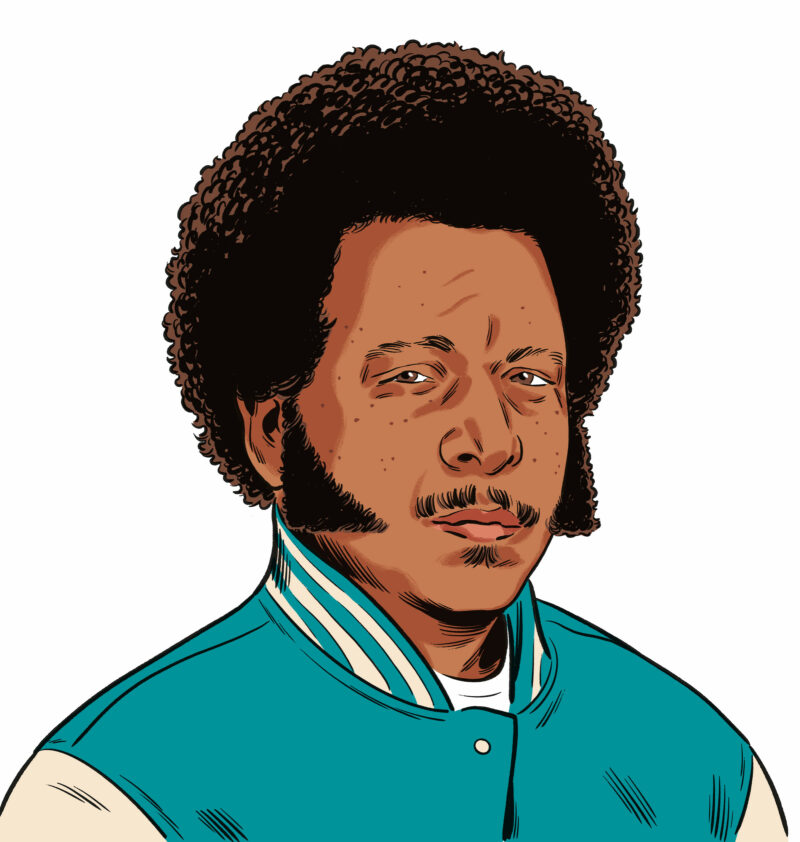I dressed carefully for my interview with Boots Riley. Layered under my flannel shirt was a purple tee featuring a cartoon explosion around the words i got the s#*@ kicked out of me! It was a deep cut, a reference to the fake game show in Riley’s movie, Sorry to Bother You, where people submit to abuse for fame and prize money. Danny Glover’s character wears this shirt during a key scene, and later the main character, Cassius, goes on the show as a publicity stunt, to bring attention to the worker strikes that are spreading across the city. Nothing sums up the power of capitalism better than watching Cassius get punched bloody on a fake TV game show while screaming about worker rights.
When Riley strolled into the coffee shop where we met in Oakland, California, he grinned. “Nice shirt!” Before I could say something in reply, the guy waiting for coffee next to us reached out to shake Riley’s hand. “You’re Boots Riley, right? I really love your work.” Fans greeted him a few more times during our interview, and Riley was always kind; he asked people’s names and chatted with them a bit before turning back to our conversation. He may be a celebrity—lead vocalist in funk-punk band the Coup, writer-director of Sorry to Bother You, and creator of surreal TV series I’m a Virgo—but he’s also a pretty humble guy. He’s the sort of celebrity whom people feel comfortable approaching, and who makes time for everyone.
That’s not a surprise. Riley’s art was inspired by his early experiences connecting with people as a labor organizer and party promoter. He doesn’t like the idea of being an authority or a superstar. He just wants to show people a good time and leave them with a better sense of how to rebel against capitalist greed and systemic racism. In Sorry to Bother You, service workers at a call center discover that they’re selling indentured servitude—and some are being fed a biotech drug that turns laborers into half-horse, half-human “Equisapiens.” In response, the workers launch a series of strikes to take down seemingly the whole city of Oakland. I’m a Virgo centers on Cootie, a thirteen-foot-tall Black teenager in Oakland whose friends are fighting gentrification while he dates a Flash-like speedster and fights a billionaire media mogul who moonlights as an Iron Man–style vigilante cop. As if that weren’t weird enough, I’m a Virgo features an animated show-within-a-show called Parking Tickets, one episode of which is so existentially bleak that it sends anyone who watches it into a state of catatonic despair.
The second-to-last album Riley made with the Coup was called Sorry to Bother You—the same title he gave to his first film. It’s full of rousing anti-capitalist songs like “The Guillotine,” and more whimsical ones like “The Magic Clap.” There are glimpses of the movie he would eventually write in some of the lyrics, and his transition from one form of media to the other feels effortless. Perhaps that’s because Riley views media as an invitation to act, rather than an end in itself.
Riley is preoccupied with the ways people are manipulated by the media—for good and for ill—and he loves to get his ideas across by using a collage of genres. He combines indie film aesthetics with bizarro science fiction subplots, comic book tropes, and splatstick body horror. As a science fiction writer, I’ve followed his work for years, because I think he’s taking the genre in a bold new direction. And yet, as I discovered while talking to him about everything from comic books to Dune and Star Wars, Riley has an uneasy relationship with science fiction. He worries about his stories becoming too far removed from reality, disconnected from people’s lived experiences.
Ultimately, Riley’s goal is to move his audience to take political action, and he doesn’t think movies set on distant planets can do that nearly as well as ones set here on Earth, in Oakland.
—Annalee Newitz
I. “They’re saying no, but why?”
THE BELIEVER: I wanted to start by talking about Oakland, because this has always been your home, and most of your work is about Oakland in some way. And yet you always give us this version of Oakland that is fantastical or absurd. Can you talk about world-building, and what it means to take this familiar place and transform it for your fiction?
BOOTS RILEY: I was involved in constructing fake worlds early on with my music, because the stuff I wrote was about a thriving movement that was only in my mind. It was nowhere in existence. I wanted to excite people about joining it, you know—get people excited about the possibilities of what that movement could be.
It’s just a different way of being realistic. So, for instance, when I started working on Sorry to Bother You, I was writing what I thought was a workplace comedy. And I got to where I wanted to include the “white voice” thing, and I did it in more of a realistic way. But as I was explaining it, I realized I was missing a piece. I was missing how it felt. I didn’t want that idea to just be name-checked. I wanted it to have a visceral feeling to it. So in one scene I decided to do something that wasn’t realistic [where Cassius, played by LaKeith Stanfield, speaks in a “white voice,” overdubbed by David Cross]. It creates a feeling of disembodiment. It makes you feel something, as opposed to just knowing something.
It really has to do with the character’s reactions, right? Because you can have a supposedly totally realistic movie and you don’t believe in it—you don’t care. But you can have elephants flying around the room, and as long as they react like real people, you believe in them.
Also, I’m trying to create a roller coaster ride. That’s one place where I disagree with Martin Scorsese’s critique of Marvel movies. He said, Oh, they’re just like amusement parks. Well, I don’t think there’s anything wrong with that. I think you can do that in a good way or in a bad way. I’m trying to take people through this ride, and I’m breaking rules as a way to catch people off guard. I wasn’t like, I want to make it fantastical. It’s just like, This works.
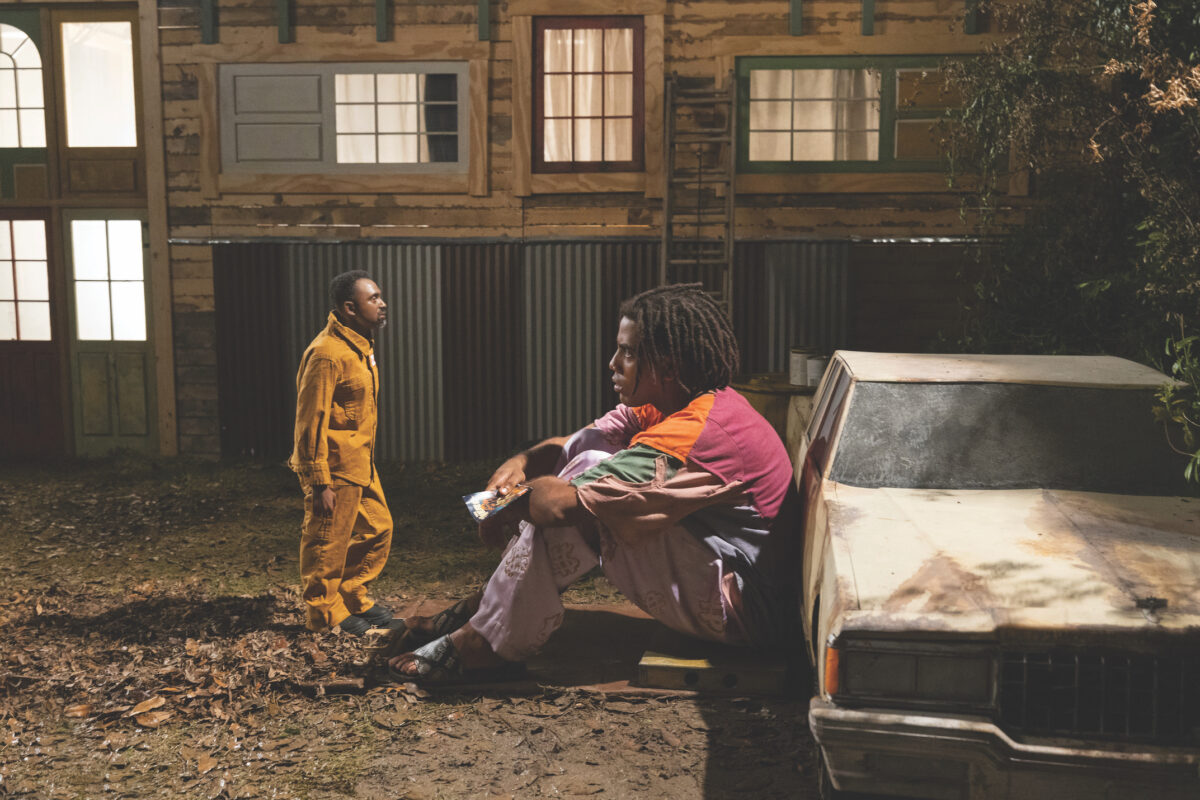
BLVR: I’ve heard you say that you think everything is propaganda.
BR: Yeah, everything has a political outlook to it, right?
BLVR: Do you think that all expression is propaganda?
BR: The word propaganda got popularized in different ways at different times. But our generation knows it as a derogatory word for what other countries do. However, in the 1980s, if you were to call Red Dawn—which was my favorite movie at the time—propaganda, people would have been like, Oh, you’re crazy. That’s just freethinking.
BLVR: But it’s completely propaganda.
BR: The real meaning of the word is just, you know, art that’s meant to try to get you to do something. Often with the Coup, I would feel like, Wow, we executed this thing on a level comparable to [that of] other artists that I think are good. But then [critics would dismiss the artistry because] it’s a political thing, right? But if there’s some other song that’s saying exactly what we’re used to hearing, then they can focus on the technique of it.
BLVR: Oftentimes you get the opposite pushback in a leftist political space, where if you’re doing something that’s fun or joyful or science-fictional, it’s like, That’s not serious.
BR: Matter of fact, a bunch of people claim the Coup isn’t political.
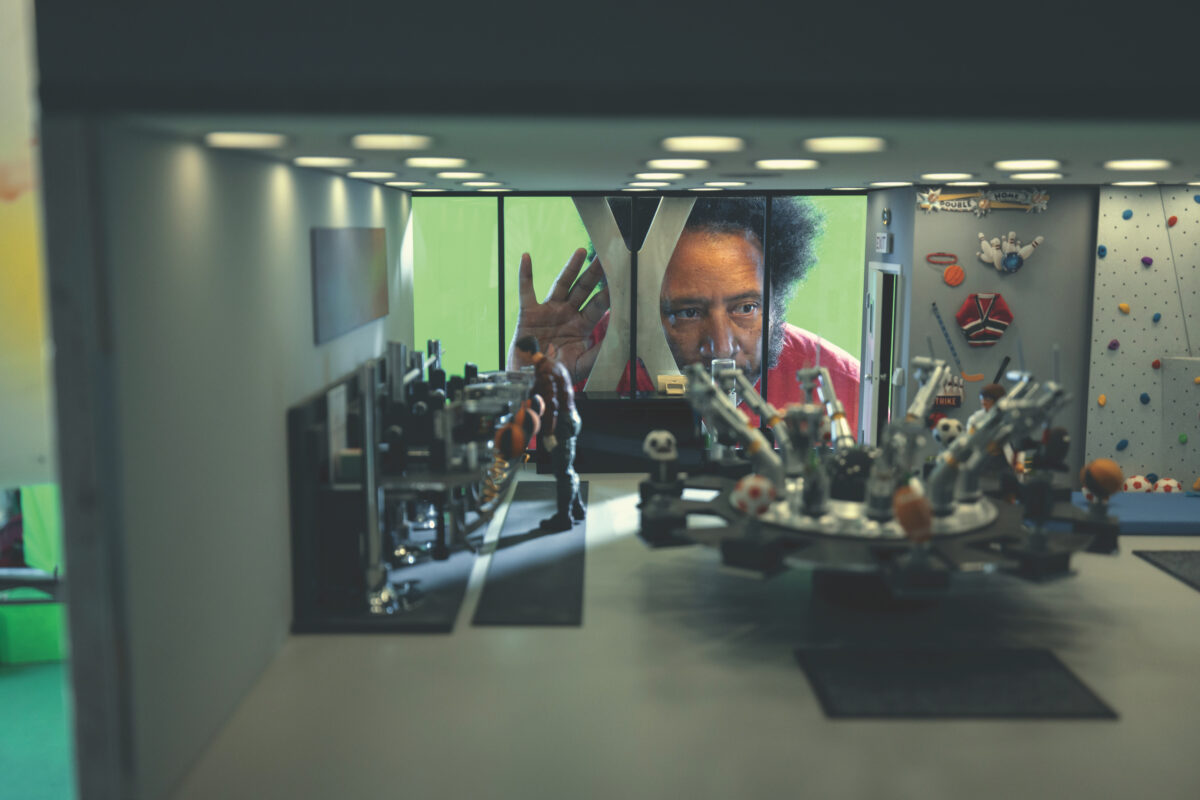
BLVR: Because you’re too silly?
BR: Yeah, exactly. I have a background where I was going door-to-door selling newspapers, talking to people, trying to get them to join a union campaign. Even as a teenager, I could see what was effective, and it was rarely We’re against this thing right now. What people went for was the possibility of success. They went for something that was affirmative and joyful. So in my work, the comic aspect of it comes from trying to have that joy.
BLVR: A lot of your characters are torn between selling out to people in power and doing something meaningful or progressive. Why are you so interested in characters who are kind of morally compromised?
BR: It’s more interesting. It’s also a lot of the people I know, maybe on smaller levels. It might be a political organization where suddenly we need to sell all this cocaine so we can get a community center. Or trying to figure out the right path in life. To a certain extent, that’s me. You know, there’s one aspect of my story that’s like, Oh, he was involved in radical organizations from age fourteen. Then there’s the other side of the story. From the age of eleven, I was doing door-to-door sales. I was a party promoter when I was nineteen, finding loopholes for liquor licenses when I was selling [liquor], and kids were running around with alcohol. There were all of those contradictions.
BLVR: Do you feel like you use any of that early experience with sales to sell your work to, say, Amazon, which coproduced I’m a Virgo?
BR: I mean, sure.
BLVR: Do you feel like you’re sort of switching between personas a little bit when you do that?
BR: I don’t know. It’s all the same, because when you’re selling door-to-door, after a while, you start trying to figure out, OK, what are the people you’re trying to sell to really saying? They’re saying no, but why? You want to know what’s important to them, for manipulative reasons. But I learned how to listen to people like that. So the first art form that I was really good at was having a conversation with people. I was good at showing them how our ideas were the same.
II. Theoretical Rebellions
BLVR: You’ve said that music saved you from comic books. And I’ve been dying to ask you about the comic books you were into as a kid.
BR: Wolverine was one. [He gestures to his large Wolverineesque sideburns.]
BLVR: So you’re still rocking the Wolverine look. Would you ever write a Wolverine comic if you were approached?
BR: You know, Marvel invited me to write a year of Deadpool. But I was about to do I’m a Virgo, so I couldn’t.
BLVR: Damn. So you were into Wolverine. Do you like the X-Men?
BR: I was into Marvel. The only DC comic I liked was sometimes Batman.
BLVR: What about the Hulk?
BR: Yeah, yeah.
BLVR: Spider-Man?
BR: I wasn’t really into Spider-Man. At a certain point, I stopped reading comics. And I actually got back into them with Saga [by Brian K. Vaughan].
BLVR: Yes, Saga is so good.
BR: And there was this one DC comic I really liked, but I couldn’t remember what it was called. I could only ever find one issue of it, and it had this big woman with fish scales, and it had a little guy with a big head, and they actually murdered people. For decades I was looking for it. It was very frustrating. But I just found it a few weeks ago.
BLVR: What is it?
BR: DC had these one-off comics called 1st Issue Specials [in 1975]. Each issue was a different first issue, introducing new characters. The reason this comic was hard to find is because it was called The Outsiders, which was also the title of a different, later DC comic. When I found it, I discovered that one of the first scenes is of this big baby that they’re carrying [like in an early scene from I’m a Virgo]. I was like, OK, that’s where I got that from.
BLVR: That stuck in your head.
BR: Yeah. But what I liked about it was that it was kind of an X-Men thing, but the people you’re supposed to relate to, they were actually grotesque. The creators went out of their way to do that. But also there was no resolution to it. They were just continuing their fight. So that definitely resonated with me. Daredevil also was a big thing for me, because Daredevil—maybe later they made it more of a superpower, but originally his senses were very heightened and he was extra trained. So it felt like, That’s something that could be real.
BLVR: And that was part of your fantasy about becoming a superhero, right? That you might develop super senses?
BR: Yeah, I would practice, you know, throwing ninja stars, karate. I was doing gymnastics and working out. Red Dawn and the comic book stuff were leading me to a very violent state of mind.
BLVR: What about comics that are intended to do the opposite, though? William Moulton Marston, the guy who invented Wonder Woman, said he wanted it to be propaganda for feminism. And there are the Black Panther and the Miles Morales comics. Can’t comics lead us in a good direction?
BR: I was reading the book The Conversations: Walter Murch and the Art of Editing Film. It’s conversations between [novelist] Michael Ondaatje and Murch over a period of a year. In it, [Murch] talks about the fact that George Lucas didn’t initially want to do Star Wars. I confirmed this when I met George: he didn’t want to do Star Wars—he wanted to do Heart of Darkness. But his version was from the Vietcong perspective, and Colonel Kurtz was a Vietnamese guy working for the US.
BLVR: Wow, that would have been so interesting.
BR: Yeah, but he couldn’t get it funded. They were like, George, this is too radical, you know? It’s just not going to happen. Even though he’d just had this hit movie, American Graffiti. He said, Well, how about if I put it in space? And that was Star Wars. The rebels are the Vietcong, and the Empire is the United States.
BLVR: Yeah, that’s something that always surprises people about Star Wars. All these right-wingers think the Rebellion is America. And it’s like, No, dude. He intentionally wanted the Empire to be America.
BR: My view is that when you make the world so different, so metaphorical that you’re on another planet, it doesn’t really speak to the real world anymore. And yet the biggest thing in the world, other than drinking water, might be Star Wars. But I don’t think Star Wars has caused one single movement to be created.
BLVR: So you’re saying that when you take a story and you make it so different to the point that it’s set on another planet, it doesn’t really speak to our actual experiences?
BR: Yeah. We think anything could happen because it’s in this other reality. You need some connections to what is happening on our world for people to question it as they’re watching. When it’s in space, you have the possibility of saying, OK, cool, a rebellion seems natural. I want to make movies where people don’t just theoretically agree to rebel if the moment is right. I want them to look at where they are right now and ask themselves whether they agree.
BLVR: So going into space is taking it too far? Mutant horse guys are cool, but space…
BR: No, I don’t think there’s a rule about it. But I think the world it’s set in—even if it’s off—has to be connected to ours. Maybe there’s a car that goes by on the street, or they have to pay to live there—that sort of thing.
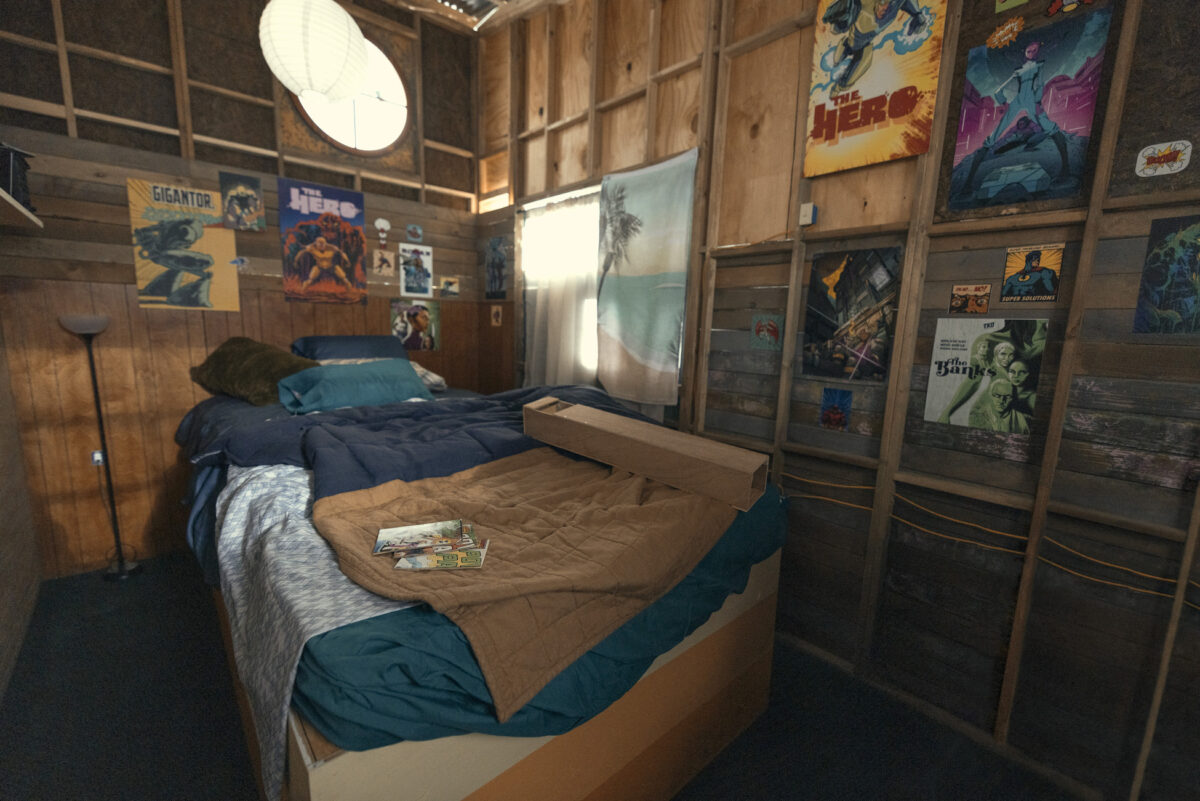
BLVR: So would a movie like Dune feel more connected because it’s about resource extraction?
BR: It could. But I think people still understand it theoretically. I’m a big fan of David Lynch’s Dune, even though I didn’t like the voice-overs, because it’s visceral. Dune: Part One was just too clean. [Denis Villeneuve] was trying to make it extra smooth. He was still trying to do that in Dune: Part Two, but it paid off visually. But he took out the Spacing Guild, the people who are eating the spice. So we never know why the spice is necessary. How does it have any value? How is it being used? Why did [Villeneuve] take that out? Spice is a commodity, which is important.
BLVR: Yeah, it’s weird because we see the means of production, we see how people are being screwed over, but we never see the commodity. We never see it going out into the market; we never see other people buying it.
BR: It’s not even said expositionally in any way. Why is the whole universe organized around this spice? Are people drinking it in their tea? What is it? So I think at that point the audience sees this as just a story about a battle.
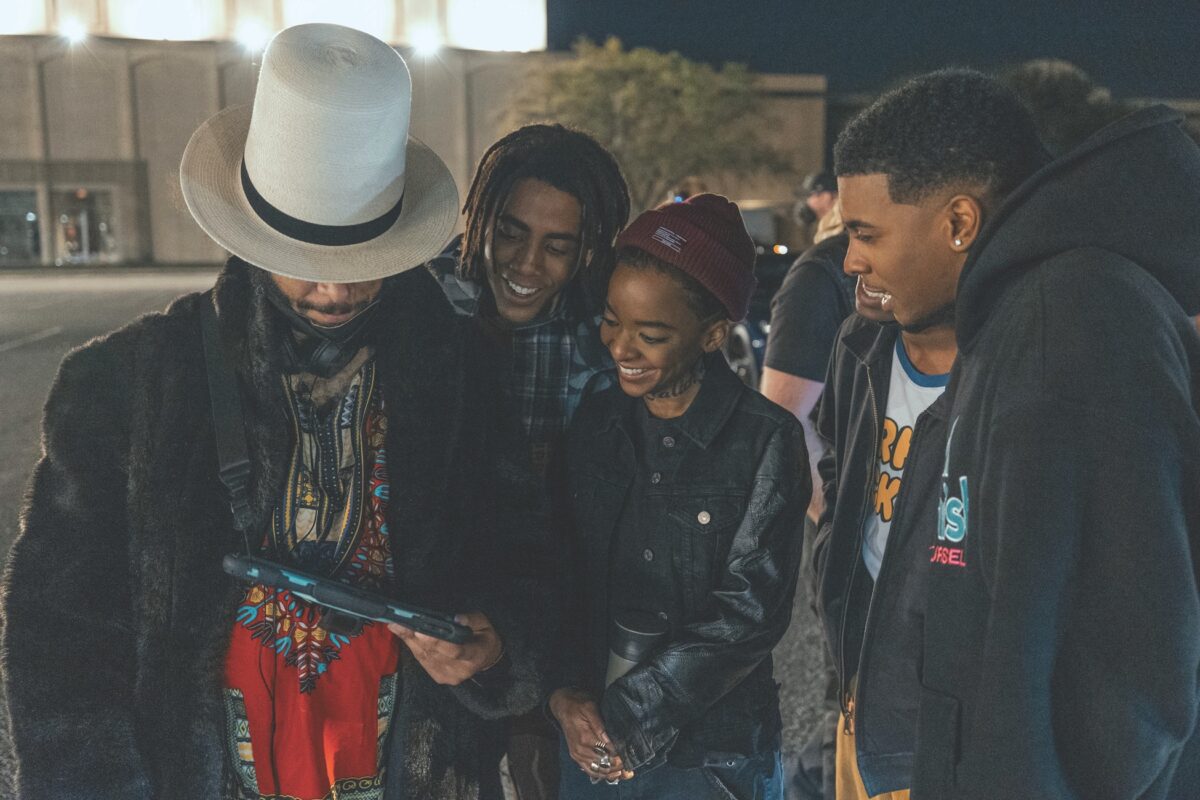
BLVR: It’s too removed from reality?
BR: It works in the sense that afterward, you can have a conversation about the Fremen and who they are. And people do that with Star Wars too. I’m not saying there’s anything wrong with that, but—
BLVR: It’s a fairy tale.
BR: Yeah. And fairy tales tell you what’s right and what’s wrong, but they’re so vague that you can replace anybody with anything. That’s why it’s not even a big stretch when right-wingers see themselves as the Rebellion. The movie doesn’t ask, Why do people like the Empire? Nobody is happy with the Empire. But obviously, in the real world, there would be some people saying, The Empire has helped me. I’m down. Like people in the military.
III. The Visceral Textures
BLVR: We were just talking about the David Lynch Dune, with all that grotesque body horror. And I really wanted to talk about male bodies in your work. There are a lot of men whose bodies are transformed. They’re made grotesque; they’re sexualized. We have Cassius in Sorry to Bother You, who becomes like a horse guy. And we eventually see the horse guys naked, and they have these giant dicks. There are similar images in I’m a Virgo. We have the spectacle of this young man’s extremely big body. What’s going on there?
BR: Originally in Sorry to Bother You, there were other full-frontal-nudity scenes. There was going to be an interrogation scene with Cassius.
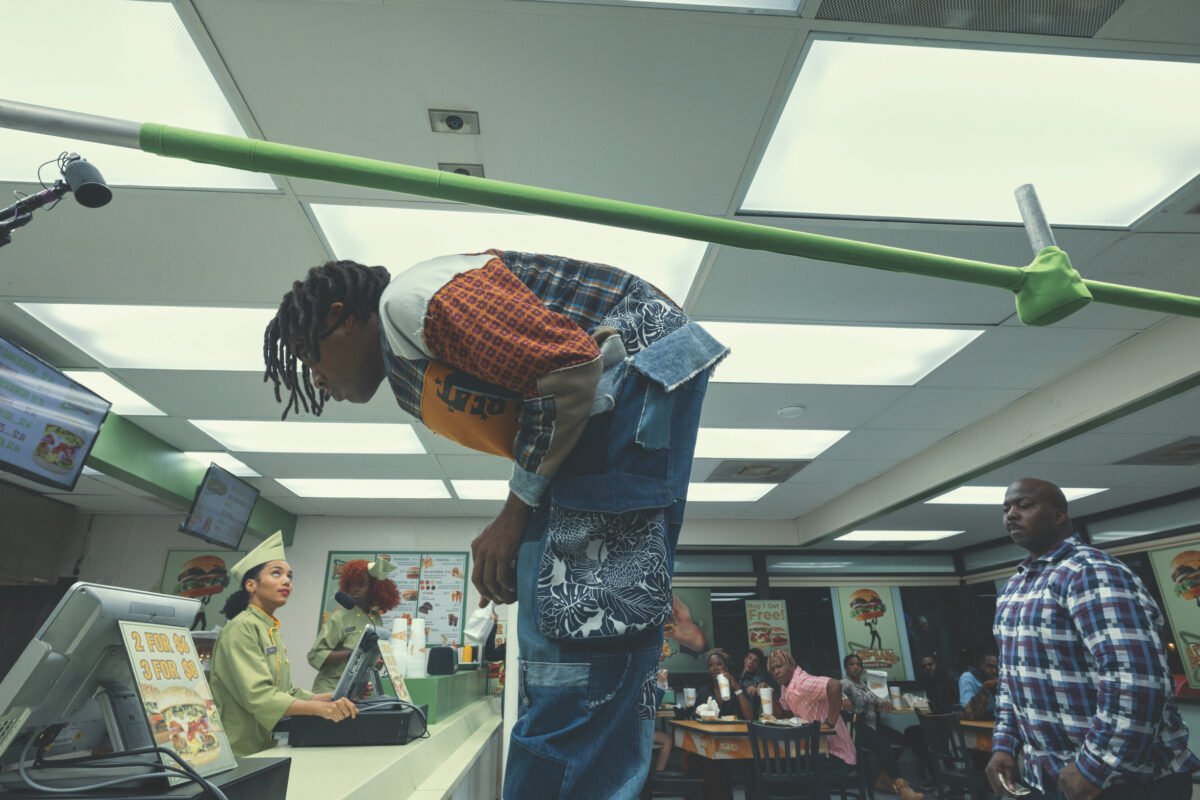
BLVR: He was going to be interrogated naked?
BR: Yeah, and Tessa [Thompson’s character’s] art show was also going to be full-frontal. But during production, we had to cut the interrogation scene. And so I was like, well, we can’t do just Tessa naked.
BLVR: Yeah, that would have been weird.
BR: Right before we were going to shoot her, I found out the other scene was going to be cut. So that’s why [she’s wearing] just the gloves: because that was the only thing I could come up with right there. But as for the Equisapiens, part of the reason for wanting the full-frontal stuff was—I mean, I’m always going for visceral stuff, to make us feel textures that exist in the world. But with the Equisapiens, people were like, Can’t you just, you know, come up with a reason why we don’t see that? I said, Look, women’s bodies are sexualized all the time. So if we’re going to have one full-frontal-nudity scene, it should be men’s bodies. And we should have penises on there. I mean, they’re just naked and free.
I wanted those characters to not care if they’re naked. I wanted them to be like, Why do we care about this shit anymore? What do we want clothes for? We’re horses. In I’m a Virgo, I also wanted that viscerality to be there. And I felt that if I did it without including full-frontal nudity, that would be even more intimate. Because it’s not really about a visual; it’s about the experience.
BLVR: Yeah, Cootie is a very different character from the Equisapiens. But you could have chosen to tell that story in any number of ways. You didn’t have to focus on his body, right?
BR: Well, the end result is never the thing. If I could snap my fingers and get to revolution, I wouldn’t, because it’s all about the journey and what kind of person the journey makes us into. I think about these more absurd ways of getting to the revolution. I am trying to repel audiences and pull them in at the same time, so they gain a different kind of awareness of what they’re watching. As a matter of fact, there are a lot of things in I’m a Virgo that are, you know, obviously fake. There are parts where it’s obvious that Cootie is a talking doll. I want to make the rest of it compelling enough that I can let you see the seams and you’ll still feel like you’re in it.
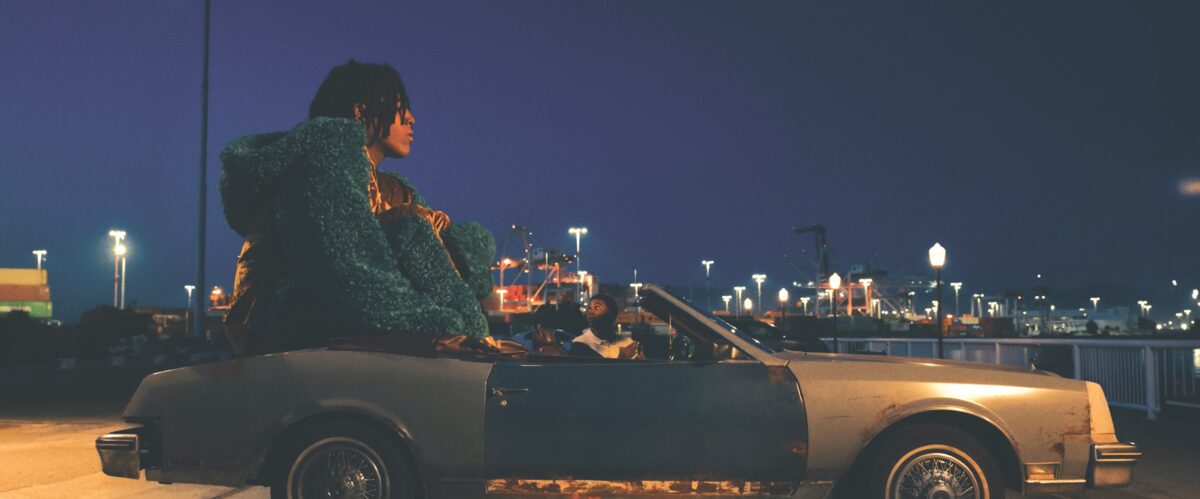
BLVR: Is that why you like practical effects?
BR: What I like about the practical aspect is that you get textures. You get the contours. Whereas some of the goal of VFX is to smooth everything out.
BLVR: I know what you mean. Practical effects have that kind of gooeyness to them. It’s like OG Godzilla versus CGI Godzilla. I like the old guy, with the bouncing rubber suit, you know? There’s something really nice about that.
BR: But there are ways to do CGI well. For instance, Kung Fu Hustle—that’s a lot of CGI, but it’s [he claps] Here it is. And it feels cool because they’re not trying to fool you. They’re just like, Here are these legs, spinning.
BLVR: It’s more zany.
BR: Have you seen Hundreds of Beavers?
BLVR: No.
BR: Oh, you’ve got to see that!
BLVR: What the heck is it?
BR: You know, it might become one of your favorite movies. It came out, like, a year or two ago. Watch the trailer; then you’ll want to watch it. It had a small budget. There’s a lot of compositing, and all the beavers are played by people in mascot suits.
BLVR: Nice!
BR: It’s a full feature that’s really good.
BLVR: Cool. So I wanted to ask you about copaganda because I remember when BlacKkKlansman came out and you were there on Twitter saying, Hello, this is copaganda. Spike Lee got money from the NYPD. I feel like nobody else mentioned that, ever.
BR: Now, to be clear, I didn’t say the movie itself was funded by the NYPD. But Spike Lee got money from them separately, to be their consultant on how to improve their image.
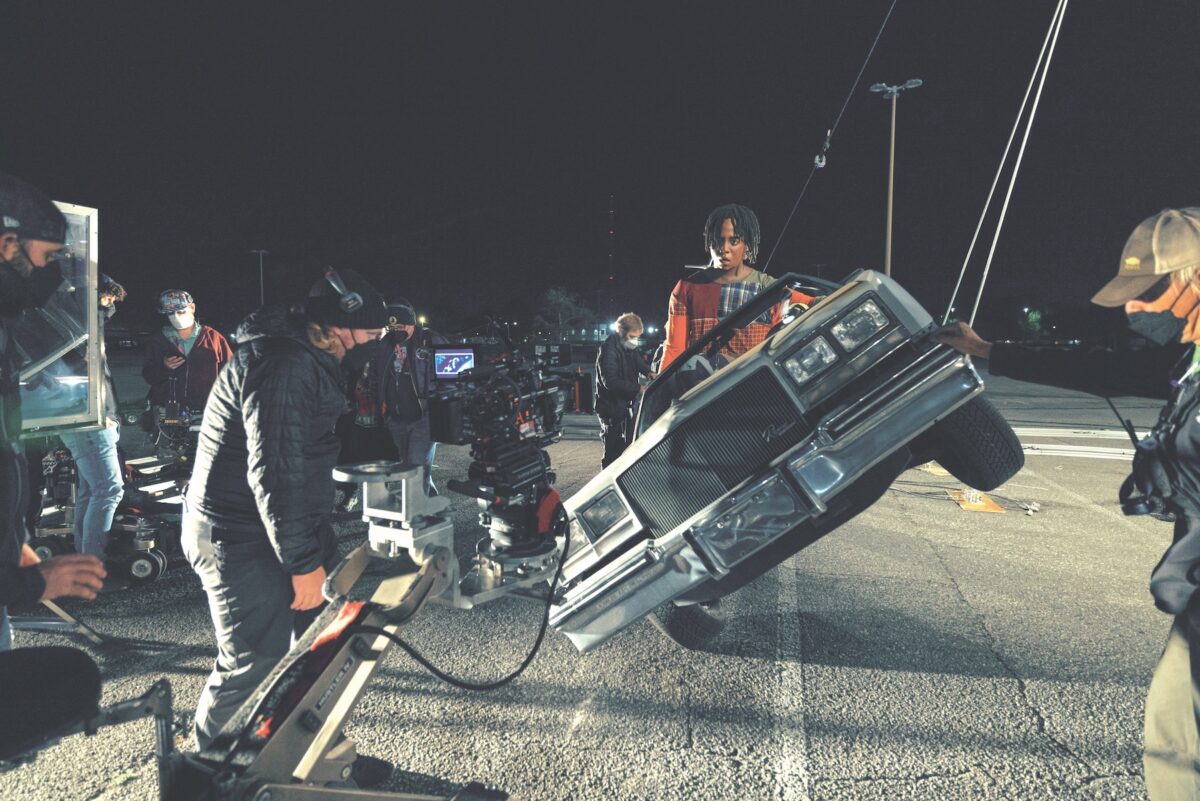
BLVR: It’s interesting because this year we have the return of the Bad Boys franchise. We have the return of Beverly Hills Cop. There are all these movies where it seems like we can have a Black male lead if he’s a cop. What do you think is going on there?
BR: I’ll say this: all of a sudden, after Black Lives Matter, that was the first time I’d seen so many Black women police chiefs. And it’s the same thing they’ve done for a while with Black men, to humanize the police force, although it doesn’t change any analysis of what police do in the real world. But it gives the impression that more people agree with the police than actually do. Because you see a movie with these stars and you forget they are movie stars and you think about them as being cultural icons, and if they agree with something, then audiences do too.
I don’t know what the funding pipeline is, but it’s cheaper if you’re doing something that helps out the military or helps out the police. It’s called a consultancy, and they provide, you know, all sorts of material support, even if it’s not financial, and it takes down the budget.
IV. “Everybody is in the system and everybody thinks they’re not”
BLVR: Your work is full of fake TV shows. We’re constantly seeing TV in the background and observing how it’s shaping our perceptions. And we’re in the midst of this presidential campaign, a lot of which is transpiring through television. How do you feel about that? How are you engaging with it?
BR: I engage with it because the world is engaging with it. And I want to know what people are thinking, what they’re saying. What gets talked about so much is whether the swing voters in the middle of the Republicans or the Democrats are going to vote for this party or that one. But the reality is that most people have not voted, and I think the reason is that they’re to the left of the Democratic Party. They’re not even an organized left—they’re not DSA folks or part of radical revolutionary parties. I think the average everyday person has views that are way to the left of the Democratic Party and so have not seen it as being something worth voting for. You know, in all these places where the Democrats lost by sixty thousand votes, there were a million people who didn’t vote.
We know that the right-wing votes. So what that tells you is that the problems people are dealing with are ones that aren’t being solved under capitalism, and none of these candidates are even willing to address that. This is without even talking about Biden facilitating genocide. But when they called Obama a socialist and people thought he was going to have socialist policies, people came out to vote for him. And to the extent that they then voted against Bernie, and for Biden, if you look at the exit polls, they thought Biden was for universal health care. That’s because people lied to them.
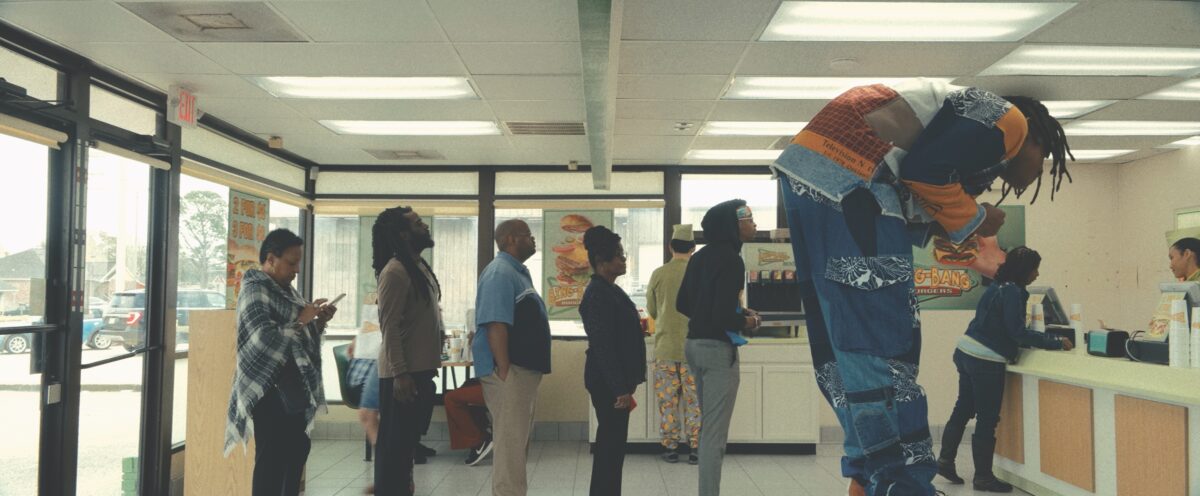
BLVR: Do you think I’m a Virgo would get greenlit now, with the way politics are headed in the States?
BR: I think no. I don’t know. I sold I’m a Virgo to [production company] Media Res. And there were a number of places we could have gone, but Amazon offered them the best deal, and I had no control over that—but I was like, Cool. They knew what the show was. Amazon was saying, We’re going to spend more money on marketing this show than ever, blah, blah, blah. But as it started unfolding, and that started getting taken back, I was told that, just across the board, we’re not spending on marketing anymore outside of the [Amazon] platform. But I see them doing that for other shows. I think maybe when we premiered at South by Southwest, something changed. There were write-ups, and that alerted certain people. And I think that call came from Seattle, maybe—who knows? This is me speculating. But I will say that all of a sudden they didn’t spend money on advertising outside Amazon, other than a YouTube push.
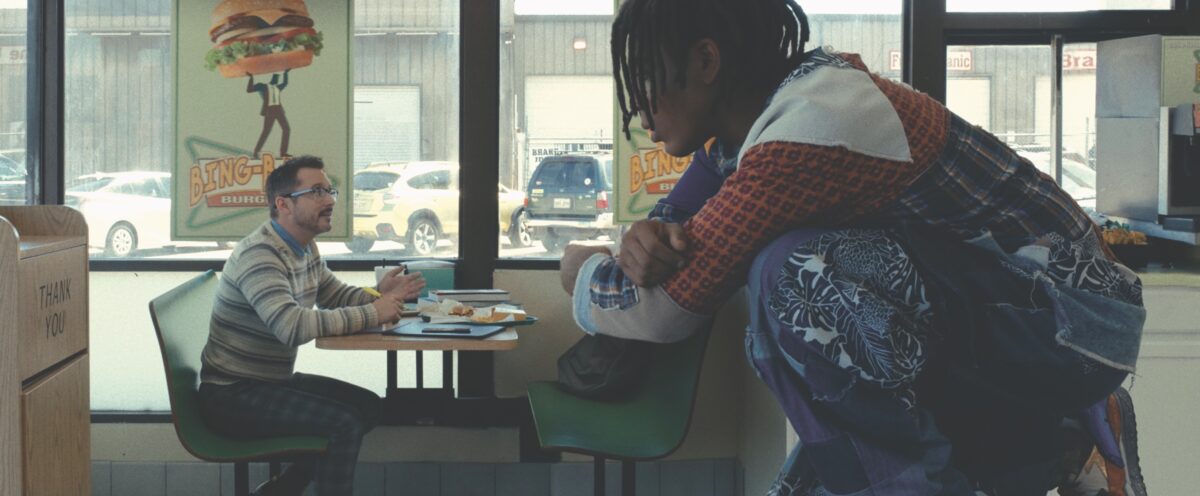
BLVR: I remember wondering why I didn’t see more promotion for the show.
BR: You know, everybody is in the system and everybody thinks they’re not. And so there were people that agree with my politics, but they never joined an organization, never did anything, because they didn’t think there was a way of doing anything about it. And so, yeah, there are executives at Amazon, Hulu—at any number of places—that agree with my politics.
I remember when Occupy Oakland started trying to make a fast-food workers’ union before the SEIU did it, and we passed out flyers at all these places, saying, Look, if you get fired, you know, we’re going to back you up. If you get fired for organizing a union, we’re going to shut this franchise down, as a guarantee against that. So everybody’s for it. And I remember at the McDonald’s in West Oakland, the manager gets up and says, “Everybody be quiet. This union is what we need.” This is the manager, right? And that’s because nobody had organized a fast-food workers’ union before that. So the leadership wasn’t ready for what happened. Even people in management didn’t know what side they were supposed to be on.
BLVR: Do you feel like I’m a Virgo kind of slipped in the same way that union organizing effort did?
BR: Yeah. I hope I’m wrong, but there might be more pushback against certain kinds of politics. The thing is, right now there aren’t a lot of filmmakers that want to put their politics forward. If your main goal is to be a writer, when it comes down to maybe losing your gig or whatever, it’s not necessarily something you’re willing to fight for. And it’s not their fault. There haven’t been political parties that help artists imagine how the world could use their art in a specific way.
BLVR: Yeah, although the writers’ strike was obviously a big turning point.
BR: Yeah, because that was a collective thing. And people are being more radical. People are taking stances that I didn’t think they would. But, you know, we need an injection of writers that are doing it for the bigger picture, the bigger goal.
BLVR: The bigger goal of?
BR: Of building a movement, right? Because if that’s an ancillary goal, it’s easier to just push it aside.
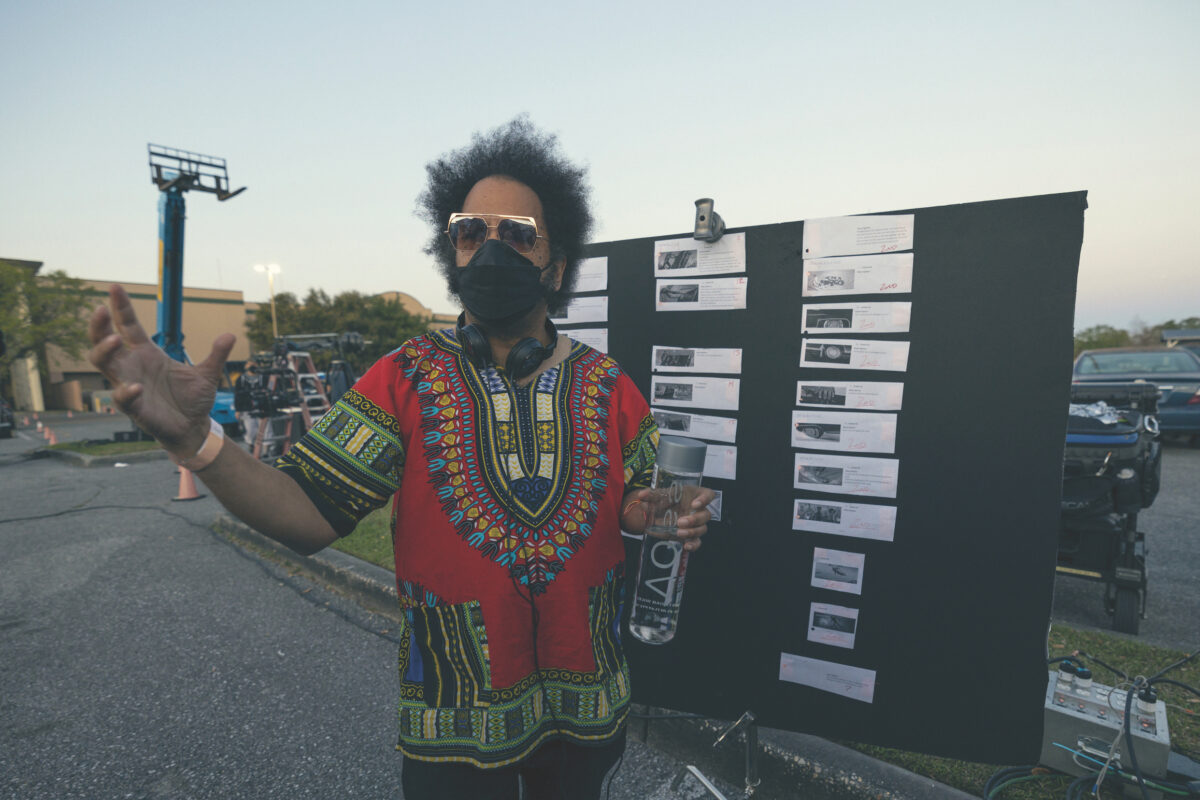
BLVR: You talk a lot about building a movement and imagining this other world where that movement would thrive. Do you see your work as utopian?
BR: I don’t know, because I don’t think that world is a utopia. I think that world still has a lot of problems. And I think those worlds already exist in different ways, in different places. One time, a band I perform with, Ursus Minor, was playing in this town in France, and the show was packed. And in the morning there were strikes because the government was changing the retirement age from sixty to sixty-two. And so strikes started happening all over the country. As we were going to the train station with all our gear, around the corner we saw thousands of people. And we realized they were going toward the train station, and they cut us off and they were like, Ursus Minor, we loved you last night, but you’re not going home. We’re shutting this down. And it was a joyful thing. I’ve seen these things. It’s not like this other dimension. And we’re seeing it happen now.
BLVR: So it’s not utopia to you, because you see it around you in real life.
BR: Yeah, I see it around me. But sometimes I’m talking about a place that we’re not at yet. I will say that when I wrote Sorry to Bother You, the strike that happens in it was something I hadn’t seen since the ’80s. But after that I saw a lot of it all over the place. So things can change pretty quickly.

